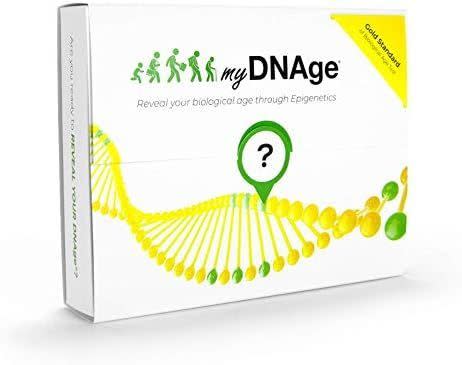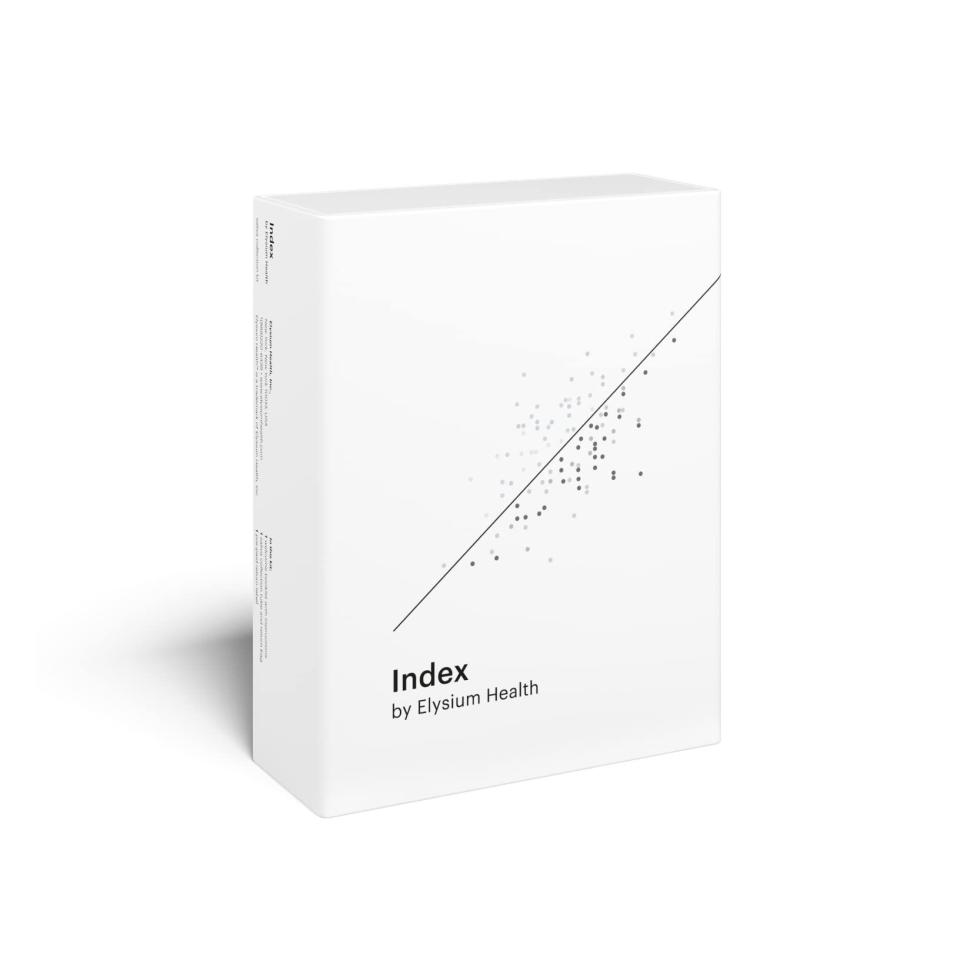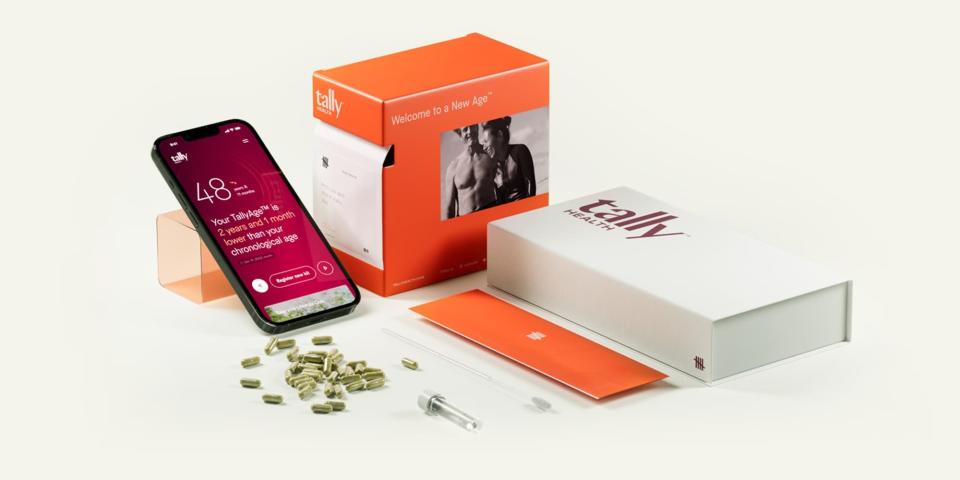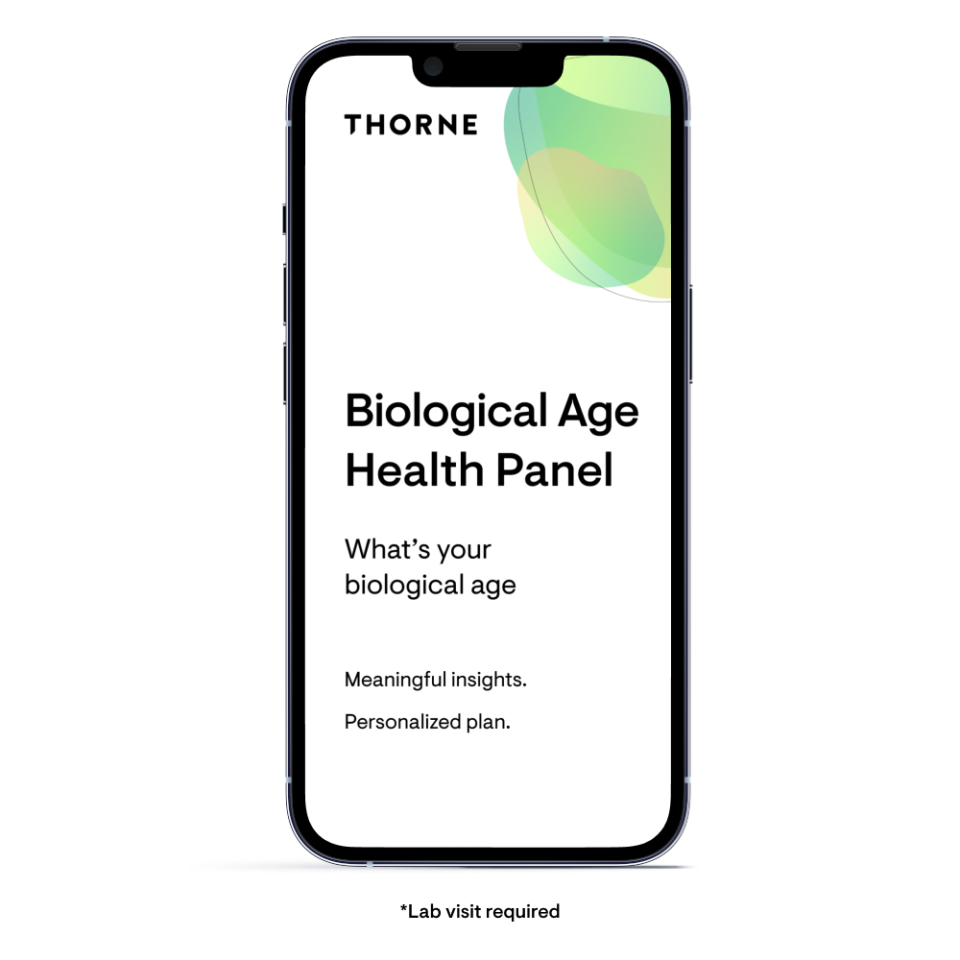'I Did An At-Home Biological Age Test. Here's What It Revealed About My Health'

"Hearst Magazines and Yahoo may earn commission or revenue on some items through these links."
In 2021, I mailed five pipettes of my blood to a lab. According to the results, my “biological age” was 17 years old. The odd part? I’d just celebrated my 29th birthday.
For context, I was simply curious to know more about my health status. Perhaps that was because of my job as a wellness writer, or the fact that while I do a lot to support my overall well-being (eating a plant-heavy diet, regular long hikes and runs, quality time with good friends, etc.), I’m also chronically stressed out. I wanted to know if my insides reflect my habits, so to speak.
While chronological age is based on the number of years you’ve been alive, biological age tells a slightly different story. There’s no single definition of it, but the idea is that you can measure how your body is aging on a cellular, physiological level (which means the resulting number may not match your years on earth!).
Meet the experts: Paola Sebastiani, PhD, is a biostatistician in biology and epidemiology of human aging and longevity at Tufts Medical Center and a professor of medicine at Tufts University.
Toshiko Tanaka, PhD, is a scientist at the National Institute on Aging.
Marney A. White, PhD, is a professor of social and behavioral sciences at Yale University.
My initial reaction to the test results: Wow, I guess I’m on the right track. Then my skepticism set in: Can that number actually be true? Is there any legitimacy to this? Bio age tests like the one I took have soared in popularity recently, leading experts to ask similar questions. Spoiler: Biological age *is* a legit concept that’s rooted in science, but the notion of quantifying it with an at-home test is still speculative.

Biological Age, Explained
Your chronological age doesn’t indicate how old you really are, because “that depends on your lifestyle, medical history, environmental exposure, how you eat, and so much more,” says Paola Sebastiani, PhD, a biostatistician in biology and epidemiology of human aging and longevity at Tufts Medical Center and a professor of medicine at Tufts University.
Biological age takes epigenetics (the study of how genes are expressed in the body) into account. In other words, it hints at the rate at which your body is actually aging, and a wide range of factors influence that outcome. “Biological age expresses the level of robustness and stability in a person’s cells,” says Toshiko Tanaka, PhD, a scientist at the National Institute on Aging. So, two people of the same chronological age could have very different biological ages depending on cellular resilience.
That’s why, for instance, if someone is 30 years old and showing signs of aging that are typically associated with someone in their 50s, their biological age results might be closer to 50. Whereas someone else who is 30 might only be biologically 24. This doesn’t necessarily mean they look older or younger than they are, but there may be giveaways on an internal level.
How Biological Age Is Calculated
There are a variety of characteristics that experts can analyze. “These biomarkers capture the rate of aging, as measured by exposure to—or lack of—risk factors,” says Sebastiani. For instance, someone who was around cigarette smoke for most of their childhood may have a higher biological age than someone who wasn’t.
While the term biomarkers can refer to anything from temperature to blood pressure, academic researchers in this space generally look at telomere length (the caps at the end of DNA strands, which get shorter as we grow older), DNA methylation (a process that affects the function of DNA segments), or other health markers in your blood.
A Web search turns up around a dozen biological age tests now on the market for as little as $100 and as much as $500. Some tests require nothing but a quick cheek swab, while others ask for blood or urine samples. In most cases, these tests analyze DNA methylation to uncover biological age.

The Deal With Biological Age Tests
Experts have understood the association between this complicated DNA biz and aging since the ’70s. But only in 2013, when UCLA aging researcher and bioinformatician Steve Horvath, PhD, created the first epigenetic aging “clock” based on DNA methylation, did it become what scientists considered an effective measurement tool. Since then, researchers have developed a variety of “clocks,” says Tanaka.
Previously, this technology was used in the research and development sector: Measuring biological age could be a useful tool for evaluating treatment efficacy (be it for a patient trying a new drug or one overhauling their nutrition), says Sebastiani. For instance, rather than waiting for years to see the impacts of a health intervention, an expert can measure biological age and see if it decreases, which indicates that a treatment is working. Pretty cool!
Now, that same technology is available as a direct-to-consumer product. One such test, myDNAge, is based on Horvath’s clock. After assessment, the company provides suggestions, tied to your results, for ways to alter your lifestyle and improve the number.
Another test is offered through Tally Health, a company cofounded by Harvard biologist David Sinclair, who is well known for his work with epigenetics and longevity. This test also looks at DNA methylation and compares the results to the company’s 8,000-person data set.
So, yes, these tools are well founded on science (and intriguing!). But whether you *need* a specialty kit and assessment to understand (and turn back) your clock is a bit of a trickier convo.
Best At-Home Biological Age Tests
Biological Age Test
Do a blood prick or take a urine sample (your choice!) in the comfort of your home and receive a metabolic health rundown, genetic variants, and your bio age.

Biological Age Test
amazon.com
$299.00
myDNAgeBiological Age Test
After you submit a saliva sample, the company analyzes 10 aspects of aging on your genome to calculate your rate of aging in key systems like metabolism and immunity, as well as in individual organs—all in approximately six weeks.

Biological Age Test
amazon.com
$299.00
Elysium HealthTallyAge™ Tests
Using simple, noninvasive cheek swabs, the lab measures your DNA methylation and compares the results to an extensive in-house dataset. The outcome: You’ll receive your bio age in four to six weeks (plus the option for personalized supplements and an ongoing membership).

TallyAge™ Tests
tallyhealth.com
$129.00
Tally HealthBiological Age Health Panel
Create a personal profile and go to a lab for a blood draw, then Thorne provides an in-depth analysis of your wellness and biological age. This test measures the impact of lifestyle, nutrition, illness, and genetics on your body and vital organs.

Biological Age Health Panel
thorne.com
$95.00
ThorneWhat Biological Age Testing Can (And Can’t) Reveal
While the promise of unlocking our personal aging pace may sound exciting (albeit straight out of a science fiction novel), there are limitations to keep in mind, experts agree.
Sebastiani points out that the technology is still rather new, so it lacks standardization across the board. Because of this, you could take five different biological age tests and end up with five different results, she says. The potential lack of precision is also a downside, in Tanaka’s view. “At the moment, we do not know whether the molecular clocks are sensitive to interventions or behavioral modification,” she points out—so even after you adjusted your lifestyle behaviors, it’s not entirely clear whether you’d see measurable changes reflected in your results.
Which brings up another consideration: how these tests might end up deterring motivation or even harming mental well-being. “The person getting ‘bad news’ could feel that the damage is done, and the person getting ‘good news’ could feel like there’s no room for improvement,” says Marney A. White, PhD, a professor of social and behavioral sciences at Yale University.
Conversely, the results may be a kick in the rear end in a positive way—whether because you got a higher number and hope to slow your aging, or you got a low one and feel even more psyched about continuing healthy choices. For some, age tests are fantastic jump starts and even turning points in their journey.
To test or not comes down to personal temperament and mindset (hey, we wish it were more black-and-white as well!). You know yourself best. “Anything that incentivizes people to be healthier is a good thing,” says Sebastiani. But that doesn’t necessarily mean dropping hundreds on an at-home analysis is the right move for everyone.
White agrees: “In reality, most people would likely benefit from making some small improvements to their health behaviors,” she says, adding that you “do not necessarily need age calculators to figure out where those areas of improvement might be.”
How To Support Longevity With Or Without A Biological Age Test
Regardless of test results, incorporating more healthful habits into your life is a smart move. Worth repeating: “The best advice for healthy aging includes being physically active, eating well, and maintaining healthy connections with friends and family,” says Tanaka.
It’s also important to understand that becoming older does not need to be synonymous with getting sicker, losing mobility, or experiencing cognitive decline, Sebastiani adds. And while testing DNA methylation is still a relatively new technology, a number of standard biometric tests (lipid panels, white blood cell count, etc.) are often covered by insurance and can offer clues to your overall health. (Have this convo with your doc!)
Ultimately, if you become intentional about your well-being, your biological age will very likely benefit—whether or not you have the score to prove it.
This article originally appeared in the September 2023 issue of Women's Health.
You Might Also Like

